The Iraqi Independent High Electoral Commission announced a 41 percent voter turnout in the country’s parliamentary general elections held on Sunday. Right before the announcement of these elections, there were various reports indicating that the chances of a high voter turnout was unlikely.
Iraqis have been living in a power bubble which is dominated by Shiites. The Islamist parties of the country enjoy a cordial socio-political and economic relationship with their neighbour Iran – a Shiite powerhouse. Since the US invasion of Iraq and the fall of Saddam Hussein in 2003, the country’s political landscape has altered. The country’s power base has shifted from minority Sunnis to majority Shiites, leading to divisions along sectarian and ethnic lines. It is a major reason behind the rise of terrorist activities that are usually drawn along sectarian divisions, by playing the rhetoric of Sunnis vs Shias, or Sunnis vs Kurds, Yazidis and other minorities.
Mostly ruled by Shiite factions and its armed wing – many of which are said to be controlled by Iran – Iraq has allowed a small group of elite to keep a firm grip on power and encouraged patronage and corruption.
The polls held on Sunday were due next year but were pushed forward by six months in response to the unrest, during which hundreds of people were killed. In a significant shift, a new law has presented the potential to help independent candidates, a move which is seen as a liberal attempt to democratise Iraqi society. However, analysts and policy makers have remarked that the law will have little or no impact as the main Shia Muslim blocs are still expected to win most seats.
The Iraqi elections are being watched closely as they will likely shape the direction of Iraq’s Foreign Policy, which will significantly impact the geopolitical landscape of the Middle East. While the UAE, Saudi Arabia, Israel and the Gulf nations present one side, Iran allegedly supports militias in Syria, Lebanon, and is involved in a proxy war in Yemen by backing Houthi rebels and is also engaging in direct conflict with Saudi Arabia. The Iraqi election results will hence, pave the way for Iraq’s future engagements in the Middle East and its relationship with Iran.
Commenting on potential outcomes of Iraq’s elections and the Arab-Iran rivalry, Marsin Alshamary a research fellow at Brookings said, “Arab states will be watching to see what gains pro-Iranian factions make in the vote and, conversely, Iran will look at how Western-leaning politicians fare… The outcome of these elections will have an impact on foreign relations in the region for years to come.”
Principal Contenders
The established Shiite dominant parties and their armed wings are amongst the major contenders with the potential to make even further claims by sweeping the elections and infusing their ideologue, either peacefully or coercively.
The movement led by populist Shi’ite cleric Muqtada al-Sadr, who opposes all foreign interference and whose main rivals are Iran-allied Shi’ite groups, is seen emerging as the parliament’s biggest faction. The Sadr-led Sairoon Alliance won 54 seats in 2018, more than any other faction, giving him decisive influence in the government’s formation. He led Shia fighters against the US forces after the invasion and inherited a cult-like following among the impoverished community, who revered his father Muhammad-Sadiq al-Sadr, a much-loved grand ayatollah, whose assassination was blamed on Hussein’s regime.
Apart from this, there are other Shiite factions known for their pro-Iranian ideology such as Fatah Alliance, led by Hadi al-Amiri. The biggest group of pro-Iranian parties is primarily led by militia commanders backed by Iran and led by paramilitary leader al-Amiri. His bloc came second in 2018 with 48 seats. The Shia paramilitaries all played a major role in defeating ISIS when it took over a third of Iraq between 2014 and 2017.
Other than that, other important Shiite parties include the Huqooq Party led by Iran’s most powerful Iraqi proxy, Kataib Hezbollah and the National State Forces Alliance, which could also emerge as potential winners.
Read more: Tensions Elevate Between Iran And Azerbaijan
Apart from this, the Sunni parliament speaker, Mohamed al-Halbousi, is leading the Taqaddum (Progress) Alliance. Although it is being said that the winner of these elections will be from the Shiite bloc and that the prevailing status quo is unlikely to be reversed.
The two main Kurdish parties are the Kurdistan Democratic Party (KDP) and the Patriotic Union of Kurdistan (PUK) party. The KDP won 25 seats in 2018, and the PUK won 18. They are likely to retain the lion’s share of Kurdish votes, followed by smaller parties.
The US Factor
As US President Joe Biden announced that their combat mission in Iraq will end by the end of 2021, with all their troops departing the country and only US trainers and advisers remaining, it seems that the results of the elections will largely benefit the Shiite faction. Iran is likely interested in America’s withdrawal from Iraq, hoping to benefit from it. It might increase Iran’s domination over Iraqi politics, allowing them to continue supporting the Syrian regime, the war in Yemen, and to suppress all Iranian opposition.










